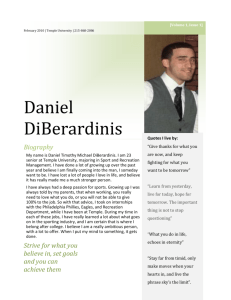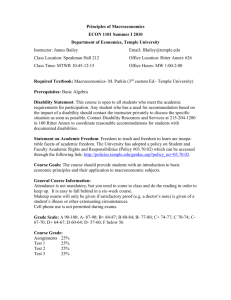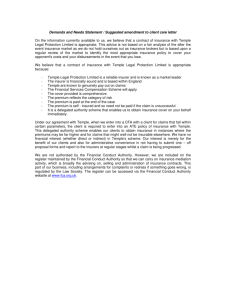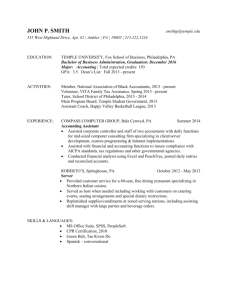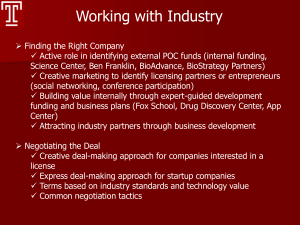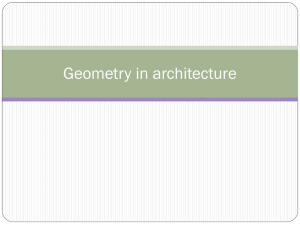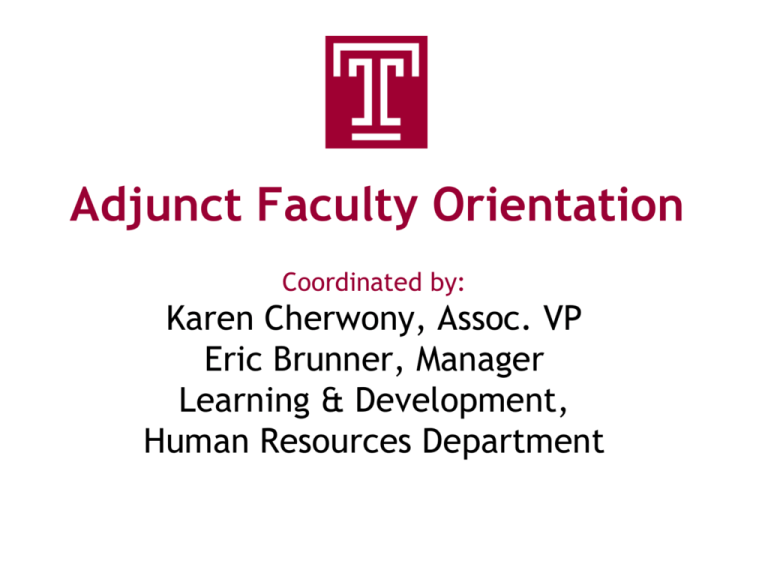
Adjunct Faculty Orientation
Coordinated by:
Karen Cherwony, Assoc. VP
Eric Brunner, Manager
Learning & Development,
Human Resources Department
Objectives
Share current and future University mission,
vision, and strategic initiatives
Introduce relevant people, services,
resources and policies related to:
–
–
–
–
Academic Affairs and Teaching
IT and Computers
Human Resources
Campus Safety
Detail our commitment to diversity and
prevention of discrimination and harassment
Introductions of Adjuncts
Name
Department
Classes You Teach
Years Working at Temple
Welcome from the President
President Hart’s 6 Strategic
Initiatives
Expanding Access to Excellence
Nurturing Community Partnerships
Increasing Global Reach
Creating a Sustainable Future
Advancing Research and Innovation
Developing a Culture of Philanthropy
Temple Today
Temple University is the
United States
28th largest university in the
Temple is a Comprehensive Research University, which has
more than
students, approximately
36,000
3,935
1,750 full time
faculty and approximately 1,400 adjunct faculty.
full time employees and
Temple is the 5th largest provider of professional
education (law, dentistry, medicine, pharmacy, and
podiatric medicine) in the country and the largest
provider of professional education in PA.
Temple Today
Temple University consists of:
17 schools and colleges, including schools of Law,
Medicine, Pharmacy, Podiatry, and Dentistry, and a
renowned Health Sciences Center with nearly 300
academic programs
7 Pennsylvania campuses
Main Campus
Health Sciences Campus (HSC)
Temple University Center City (TUCC)
Temple University Ambler (TUA), PA
Tyler School of Art Elkins Park, PA
Podiatric Campus
Temple Harrisburg
Temple also has campuses in Tokyo, Japan & Rome, Italy and
educational programs in China, Israel, Greece, Great Britain
and France
Temple’s Senior Leadership
Ann Weaver Hart
Lisa Staiano-Coico
Edmond Notebaert
Anthony Wagner
Larry Lemanski
Stuart Sullivan
George Moore
Kenneth Lawrence
President
Provost, Sr. VP Academic
Affairs
Sr. Exec. VP Health Sciences
Sr. VP, CFO & Treasurer
Sr. VP Research & Strategic
Initiatives
Sr. VP Institutional
Advancement
Sr. VP, University Counsel,
Secretary
Sr. VP Government,
Community and Public Affairs
TLC Contact Information
Location:
The TECH Center, Suite 112
1101 Montgomery Ave.
Philadelphia, PA 19122
TU Zip: 286-09
Website: www.temple.edu/tlc
Email: tlc@temple.edu
Phone: 215.204.8761
Office of the Senior Vice Provost for
Faculty Development and Faculty Affairs
Comprised of two departments:
1. Faculty Affairs:
http://www.temple.edu/vpfaculty
•
Retention, tenure, and promotion; faculty
recruitment and hiring; professional development
opportunities; and more.
2. The Teaching and Learning Center:
http://www.temple.edu/tlc
•
•
Provides programs and resources designed to promote
teaching methods that are consistent with the
research on how people learn;
Provides opportunities for faculty and TAs to reflect
on their work, and to share, and learn, from the
experience and expertise of their colleagues.
Adjunct Faculty Handbook
The adjunct faculty handbook is available online at:
http://www.temple.edu/vpfaculty/Documents/Adj
unct_Handbook_08_09.pdf/
The adjunct faculty policy is NOT available online as
it is currently being revised
Adjunct Faculty Handbook
Highlights
The syllabus (policy #02.78.13)
Text Book
Cancelling class
Class Lists
Class attendance policy
Grade Inflation
Problem(s) with a student
Using Temple Technology
Adjunct Faculty Handbook
Highlights
OTHER USEFUL INFORMATION
5.8 Reporting Final Grades
5.8.1 Incomplete Grades
5.8.2 Changing Grades
6 Teaching and Learning Resources
12 Academic Calendar
Academic Policies (undergraduate):
http://www.temple.edu/bulletin/Academic
_policies/policies_part1/policies_part1.sht
m
Academic Policies (graduate)
http://www.temple.edu/grad/
Teaching and Learning Center
(TLC) Mission Statement
Promote the value and practice of excellent
teaching to facilitate student learning and growth.
Provide programs and resources designed to
promote teaching methods that are consistent
with the research on how people learn.
Provide opportunities for faculty and TAs to
reflect on their work, and to share and learn,
from the experience and expertise of their
colleagues.
Integrates scholarly research and student
assessment into effective teaching and learning
practices.
TLC Staff
Pamela Barnett
Associate Vice Provost & Director
Carol Philips
Associate Director
A. Baris Gunersel
Assistant Director
Mary Etienne
Lead Administrative Specialist
Complementing Teaching, Learning,
& Technology Support
Gail Gallo, Seminars & Training
About Computer Services
Academic Computer Services
Administrative Computer Services
Computer Business Services
Computer Recycling Center
Data Center/Enterprise Systems
Information Security
Technology Support
Telecommunications
Academic Computing
Who we are
Service Desk
Information Services
Acadmic Computing
What we do
Provide 24/7 Learning & Technology
Support
Deliver Collaborative Technologies
Support the Delivery of Face-to-Face
Instruction
We Listen to Your Technology Concerns to
Offer & Provide Solutions
The TECH Center
Providing 24/7 Learning and Services
Student Computer Center
Social Spaces & Collaboration
Service Desk
Faculty Instructional Support
Seminars & Training
Classroom Technology Support
Largest Facility of Its Kind in the Nation
The TECH Center
Offering a collaborative
friendly pathway . . .
leading to . . .
Social Spaces
Social Spaces: A Place to Study & Relax
Social Spaces
Specialty Labs to Produce Music, Graphics, & Video
Breakout Rooms for Collaboration & Study
Digital Recording Booths For Vocal Narration
& Podcasts
Social Spaces
Computer Labs with Over 600 PCs & MACS
Technology Support
Service Desk
Offering Technology Support by
Professionals
24/7 Walk-in, Call-in, E-mail, or Web chat
support
PC Clinic
Statistical Software Support
Desktop Office Support
Virus Protection
Identity Management
Faculty Support
The Faculty Wing
Instructional Support Center (ISC)
– Offering One-On-One Consultation by
Instructional Designers
• Online Teaching & Learning Materials
• 24/7 Instruction & Classroom Interactivity
• Instructional & Production Services
Faculty Presentation Rooms
Seminars & Training
Instructional Support Center (ISC)
Online Teaching & Learning Materials
Blackboard - Offering access to:
–
–
–
–
–
–
Turnitin
Scholar
e-Portfolios
Learning Objects: Blogs & Wikis, Search LX
Expo LX
Gallery
iTunes/Podcast
Instructional & Production Services
Instructional Support Center (ISC)
24/7
Instruction & Classroom Interactivity
24/7
TUCapture
Acrobat Connect
TurningPoint
Horizon Wimba
– Voice Tools
– Live Classroom
http://www.temple.edu/cs/isc
Faculty Wing
Faculty Presentation Room (111)
Breakout Room (107)
Faculty Lounge with E-mail Terminals
Seminars and Training
Free Hands-On Seminars for Faculty,
Students, and Staff of All Skill Levels
Blackboard
TurningPoint
Microsoft Office
Dreamweaver
http://www.temple.edu/cs/training
Classroom Technology
Support
Smart Classrooms
– Touch panel
– Remote access and
management (Meeting Manger)
NetOps School
– Share screen with class
– Monitor student activity
– Prevent students from
accessing Web sites
– Remote control student
screens
http://www.temple.edu/cs
Thank you!
Questions?
ggallo@temple.edu
Temple University Pays by
Direct Deposit
Two Options for Banking on Temple
Campuses
1. PNC Bank – offers many perks for
Temple faculty
2. Philadelphia Federal Credit Union
Health Benefits for Adjuncts
Specific eligibility requirements – letters
have been mailed to eligible part time
faculty
For further information on eligibility, plan
features, etc.
– visit the HR Benefits website:
http://www.temple.edu/hr/faculty/adjuncts.htm
– Call 215-204-1321 and ask for Geri O’Kane or
Renee Larson
Independence Blue Cross
and Campus Recreation
200+ workout
stations
314 meter indoor
track
large aerobics
room
martial arts room
4 racquetball
courts
outdoor
multipurpose
court
locker rooms,
support areas
Employee Access Fees for
Usage of Recreation Services
Term Payment Plan
Valid Temple ID
$55/semester (Fall/Spring)
$30 Summer Session I & II
Pay at Bursar’s office or Campus Recreation
main office, 102 McGonigle Hall
EMPLOYEE MANUAL
Policies and procedures apply to all
faculty and staff (including student
workers, temporary employees, TA’s &
RA’s, Post Doctoral Fellows and
volunteers)
Employees are required to learn
procedures in manual and abide by
them – all new faculty/staff sign form
The University may make changes
periodically in the policies
The official copy of the manual can be
found @ www.temple.edu/hr or
http://policies.temple.edu
10.9 Expectations for Work Related Behavior
All employees must conform to certain basic
standards of behavior
Abide by all policies and procedures set forth
in the Employee Manual and official Temple
policies.
Meet established expectations of job
performance.
Comply with attendance policies.
Meet stated standards of efficiency.
Respect the personal and property rights of
Temple, other employees, students,
patients, clients & visitors.
10.9 Expectations for Work Related Behavior
Follow University and departmental rules and
policies including, harassment/discrimination/
retaliation policies, Conflict of Interest Policies,
and NCAA policies.
Maintain a courteous and professional demeanor.
Engage in appropriate conduct in the
performance of duties.
Support management’s goals and objectives.
Observe all safety policies, regulations &
procedures.
Rules of Conduct are a guide to violations of expected
behavior
Sections of the Employee
Manual that Apply to You
Some of the terms and conditions of your employment are
detailed.
Please make sure you read sections:
1.0
Introduction
2.0
About Temple University
3.4
Academic Personnel
4.1
Employment Applications and Other Forms
4.3
Accuracy of Personnel Information
4.5
Employment Eligibility
8.0
The Unforeseen Injury (Workers Compensation)
9.0
Your Paycheck and Expenses
13.0 University Standards
14.0 Employment Standards
13.0 Conflict of Interest
13.5 Conflict of Interest – Employees
– All employees are required to use good faith
in all transactions involving their duties
– Disclosure to chair of any potential conflict of
interest.
13.6 Gifts and Conflict of Interest
– Disclose gifts > $50 (lunches, concerts, gift
certificates, sporting events).
– Special limitation on sponsorships of dept
programs – prohibited if dept/unit has
decision making authority over vendor
selection/business relationship.
– See University policy on Gifts and Conflict of
Interest at http://policies.temple.edu.
13.0 Conflict of Interest
13.7 Conflict of Interest – Faculty
– Must avoid any conflict or appearance of
conflict in dealing with organizations or
individuals having or seeking to have
business relationships with the University.
– Disclosure to chair and/or Dean
13.0 University Standards
13.8 Drug Free Workplace
– Everyone is responsible for ensuring that Temple is a drugfree, healthful, safe and secure work environment
13.9 Drug & Alcohol Abuse
– Use of unlawful drugs or abuse of lawful alcohol or drugs is
prohibited
13.10 Drug & Alcohol Testing
– Pre-employment
– Reasonable suspicion/after an accident
13.11 Gambling in the Workplace
– prohibited
13.12 Political Activities
– May not use position or university connection in any way
– If elected, duties cannot interfere with work
University Safety Standards
13.14 Safety
– Employees must follow all safety regulations
promulgated by EHRS
– Employees responsible for reviewing EHRS
website
You can be Temple’s Safety Net
– Civility on Campus– a practical guide and
step-by-step process for dealing with incivility
on campus or in the classroom.
– Referral Guide for Faculty & Staff
– Tuttleman Counseling Center & Care Team
– www.temple.edu/counseling
14.0 Employment Standards
14.1 Weapons on Campus
– Prohibited except for Temple
Police/Campus Safety
14.2 Violence in the Workplace
– Threatening or violent behavior towards
anyone prohibited
– Physical, written, oral, expressions,
behavior, email, telephone, stalking
– Reporting of such required
14.0 Employment Standards
14.5 Confidential Information
–
–
–
–
Everyone must abide by policy
Everyone will sign a confidentiality form
Failure to sign/abide – termination
Student information is confidential
14.6 Workplace Surveillance and Searches
– Employees on notice that Temple may
– For safety related concerns
14.0 Employment Standards
14.7 Use of Communication Systems
– For lawful TU purposes only
– TU has right to investigate concerns regarding unlawful
use
14.8 Monitoring and/or Recording of Telephone Calls
– For business purposes
– Employees will be notified if department monitors
– Employees must consent.
– HR will try to move if consent withheld – but no
guarantee
14.9 Voicemail and E-mail
– Notice to employees that Temple has right to review
for business purposes including investigation of
inappropriate use.
14.0 Employment Standards
13.13 Software and Computer Usage
– Policy governing software, hardware, and
computer related equipment/resources
owned by Temple – usage strictly for
Temple purposes
– Any Temple employee, student, retiree,
consultant who has access to or uses a TU
system to conduct TU business must abide
by TU policies
14.10 Computer, Internet and Computer
Games
– Not in a way that violates harassment
policy
14.0 Employment Standards
14.16 Severe Weather
– If classes are canceled, all admin/staff expected
to report
– Employee is responsible for checking status of
Temple
– Faculty responsible for checking if University is
closed
14.17 Emergency Closings
– Policy pertains to closure of University for
extreme conditions
– May not pertain to cancellation of classes
– Emergency Notification System – update ESS
What is Workers’
Compensation?
A state mandated law
Defines the liability of an employer to pay
medical and indemnity (wages) benefits for work
related injuries
100% Employer Sponsored
– Speedy remedy
– No-Fault System
– Pays a percentage of income and non taxable
WC RIGHTS & RESPONSIBILITIES
To notify your chair when you are injured – even
if you do not require medical treatment and
complete an incident report
To proper medical care - treat with the posted
panel of physicians for 90 days
Switch medical providers
Second opinion for surgical procedures
Notify your chair/Temple of any changes in your
medical or employment status.
Fraud provisions for non-compliance
REPORT ALL UNSAFE CONDITIONS
IMPORTANT NUMBERS
EMERGENCIES - CAMPUS POLICE
215.204.1234 or 1-1234
TO REPORT UNSAFE CONDITIONS, SAFETY
RELATED PROBLEMS, OR TO GIVE SAFETY
RELATED TIPS OR SUGGESTIONS
HEALTHANDSAFETY@TEMPLE.EDU
WORKERS’ COMPENSATION
215.204.3328 or 1-3328
WORKCOMP@TEMPLE.EDU
Campus Safety Services Facts
Campus Safety Services operates 24 hours a day,
7 days week and 365 days a year
Includes Police and Security Officers
Officers are responsible for calls for service,
periodic checks of all campus buildings, crime
prevention, medical escorts, traffic regulation,
“manual” vehicle lockouts along with many other
duties.
www.temple.edu/safety
For help, emergencies, or
to report a fire or crime, call
215-204-1234 or 1-1234
Temple University’s
Non-Discrimination Policy
Academic Community that respects diversity
Committed to the principles of affirmative action
to ensure equal opportunity for those historically
excluded and to foster diversity
Does not discriminate on the basis of:
– Race, color, religion, gender, sexual orientation,
national origin, ancestry, age, disability, marital status
or veteran status
Report discrimination to your Chair, Office of
Multicultural Affairs or HR
(Employee Manual, Section 13.1)
Temple University’s
Non-Discrimination Policy (continued)
Allegations are promptly investigated.
Confidentiality protected as much as possible
Retaliation is prohibited against all employees
participating in an investigation.
Discrimination in violation of this policy is subject
to disciplinary action, up to and including
discharge.
Supervisor, who has knowledge of
discrimination but takes no action to end it, is
also subject to disciplinary action, up to and
including discharge.
Anti-Harassment Policy
Temple University is committed to creating and maintaining
an academic and work environment free of all forms of
harassment
Includes harassment based on:
– Sex /Gender
– Race/Color
– Sexual Orientation
– Religion
– National Origin
– Age
– Disability
– Marital Status
– Pregnancy
(Employee Manual, Section 13.3)
Enforcement of
Anti-Harassment Policy
Actions will be taken to:
Prevent, Correct, and if necessary Discipline
behavior which adversely impacts the academic
or work environment
Use of University communication, voice mail or
email/computer system in a harassing manner is
prohibited and will result in disciplinary action, up
to and including discharge
Retaliatory actions will be subject to disciplinary
action
Harassment Awareness Quiz
What is Harassment?
A type of unlawful discrimination
An educational or work environment that is
permeated with discriminatory intimidation,
ridicule, and insult that is sufficiently severe or
pervasive to alter the conditions of the victim’s
educational or work environment by creating an
abusive environment.
Examples
–
–
–
–
–
Vulgar Language/Off Color Comments or Jokes
Inappropriate Materials/Visual Displays
Offensive emails
Inappropriate touching
Work-related off-premises conduct
What is Sexual Harassment?
Unwelcome
Sexual advances
Requests for sexual favors
Dissemination of sexually offensive
or suggestive written, recorded or
electronically transmitted messages
Other verbal or physical conduct of a
sexual nature when…
Sexual Harassment
Submission to such conduct is made explicitly
or implicitly a term or condition of instruction,
employment, or participation in a University
activity; or
Submission to or rejection of such conduct is
used as a basis for evaluation in making
academic or personnel decisions affecting
an individual; or
Such conduct has the purpose or effect of
unreasonably interfering with an individual’s
performance or creating an intimidating,
hostile, or offensive University environment.”
Illegal Harassment ...
May be Quid Pro Quo or Hostile
Environment
Severe or Pervasive
As judged by a Reasonable Person
Alters the conditions of victims
educational environment
Includes conduct by people of same sex
and peers
Based on common sense and social
context
Faculty/Student
Relationships
No instructor shall:
– make a sexually suggestive or intimidating remark
– ask a student for a date or sexual favor
Sexual or romantic relationships are prohibited even if
consensual between:
– instructors and students in their courses
– instructors, advisors, coaches, physicians, or other
similar individuals and students they are advising,
supervising or evaluating or whose academic or career
opportunities they are directly or indirectly effecting
(Employee Manual, Sections, 14.3 and 14.4)
Prohibited Consensual
Relationships
If a consensual relationship
develops between a student and
instructor, the instructor should not
evaluate the student without prior
permission by the Dean
Relationships between supervisors
and their subordinates are also
prohibited
Contrapower Harassment
Harassment of those with more
“organizational/formal” power by those with
less.
Students harassing faculty
Behaviors include:
– Suggestive looks, physical harassment,
verbal remarks, anonymous, inappropriate
phone calls or letters, negative comments
about a professor
Source: “Contrapower Harassment and the Professorial Archetype: Gender,
Race, and Authority in the Classroom,” Buchanan and Bruce
Retaliation is Prohibited
Temple Policy prohibits adverse action
against:
– Complainants
– Witnesses/other participants in
investigations
May occur regardless of whether charge
of harassment is founded or unfounded
http://www.temple.edu/hr/departments/employeerelations/documents/Retaliation-Policy.pdf
What to do if You are Harassed
Confront the Harasser – let him/her know that the
behavior is unwelcome
Keep a Record
Immediately report it to:
Your supervisor
An ombudsperson
The Office of Multicultural Affairs (Ground floor, Mitten Hall,17303)
Human Resources/LR (203 USB, 1-1319)
The Office of Multicultural Affairs will conduct a prompt
investigation
Contact SACE, Tuttleman Counseling Center, for
counseling (ground floor, Sullivan Hall, 1-7276)
Office of
Multicultural Affairs
Mitten Hall, Lower Level
1913 N. Broad Street
Philadelphia, PA 19122-6092
phone 215.204.7303 fax 215.204.8052
omca@temple.edu
Staff
Rhonda Brown, AVP
Sandra Foehl, Director, Affirmative Action/Compliance &
Investigation
Tracey Hamilton, Assistant Director, Affirmative
Action/Compliance & Investigation, 215.204.7438
Tiffenia Archie, Faculty Recruitment & Retention
215.204.9213
Offices to Contact for:
Harassment/discrimination
– Office of Multicultural Affairs
Employee misconduct/Union issues/Inappropriate supervisor
conduct
– Human Resources
Faculty misconduct/Conflict of interest/Academic fraud
– Provost Office
Student academic misconduct
– Student Affairs
Criminal activity/Threats of risk
– Campus Safety Services
Misuse of university computer and network systems
– VP Computer Services
Data privacy issue
– Information security and privacy officer
Important Temple Web-Sites
TUportal – your door to all electronic systems
– https://tuportal3.temple.edu
Human Resources
– www.temple.edu/hr
Employee Self Service
– ess.temple.edu
Policies
– http://policies.temple.edu
Office of the Provost
– http://www.temple.edu/provost
Please complete
Evaluation
Workers’ Comp. Form – retain pink copy
Confidentiality Form
Receipt of Employee Manual and Rules of
Conduct
Thank you for your contributions to
Temple and for attending this evening!

